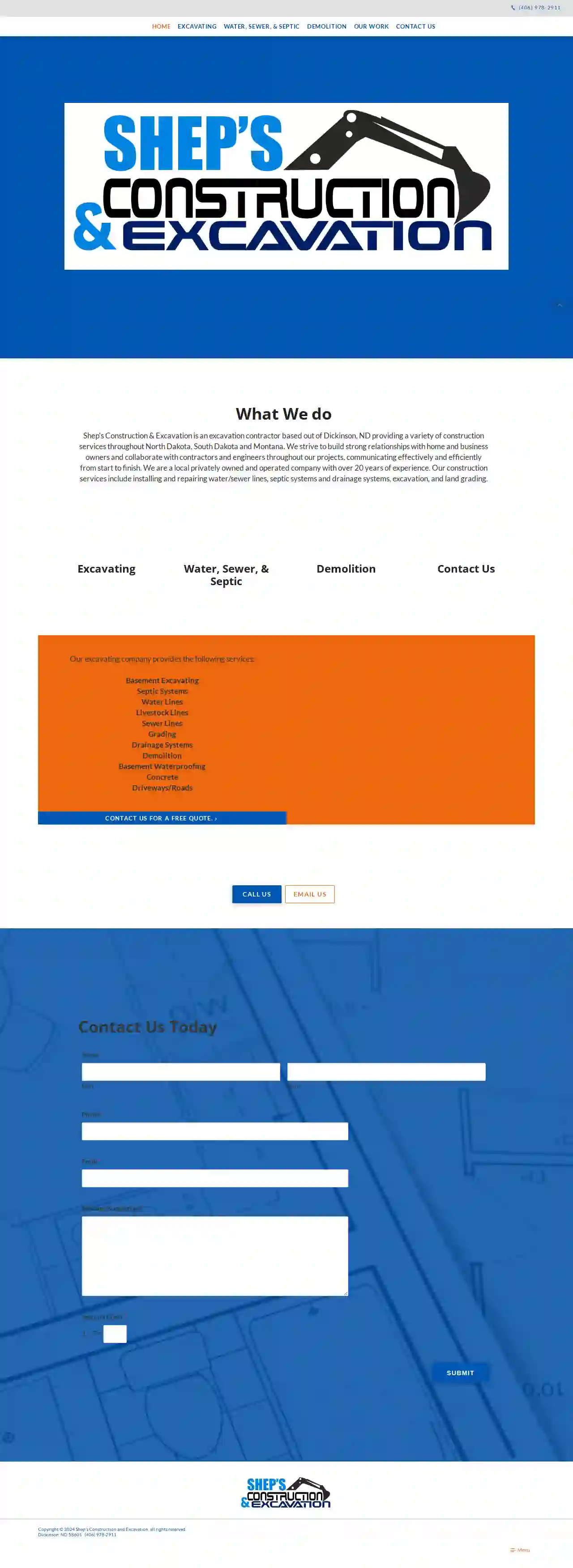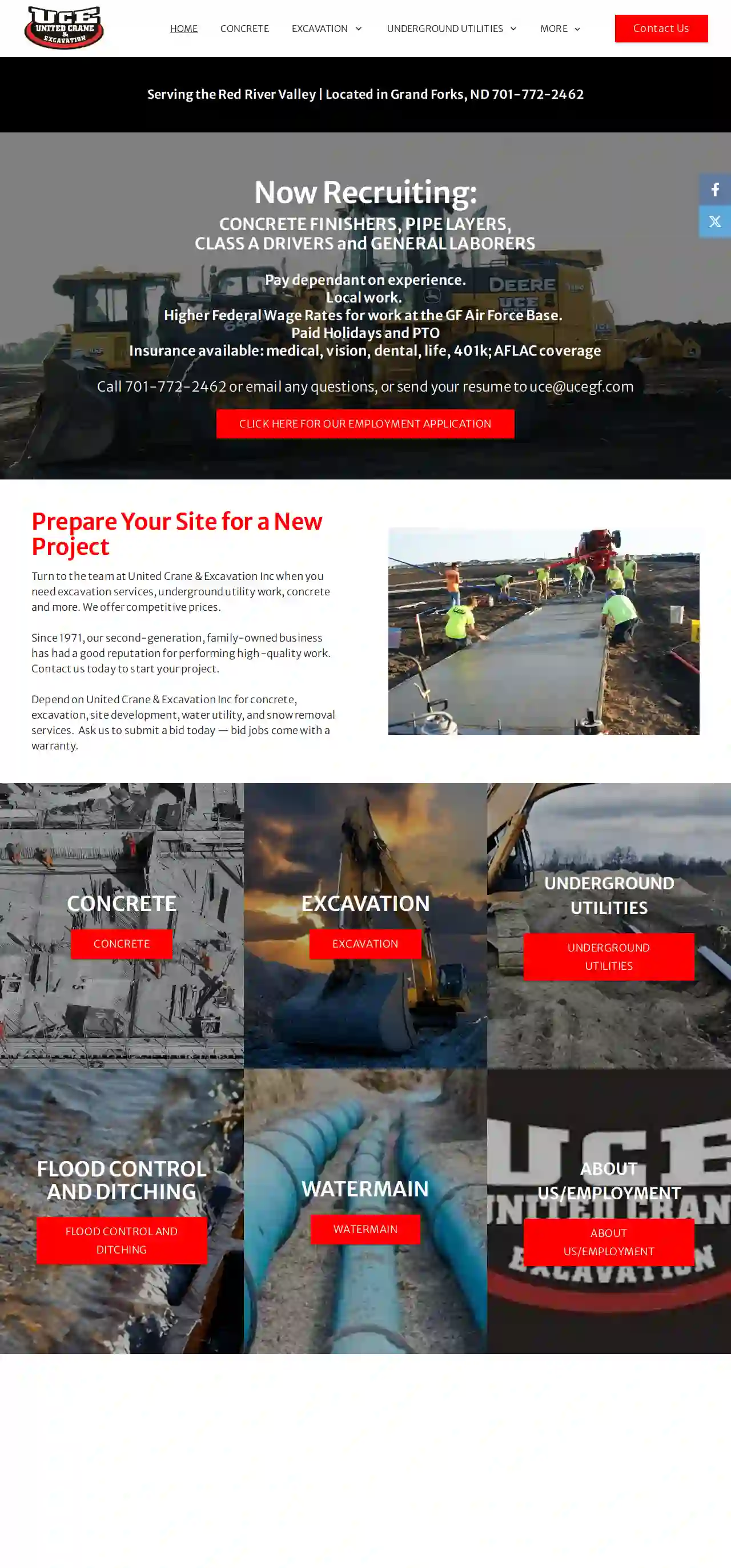Excavation Contractors Fargo
Find the best Excavation Contractor in Fargo
Get up to 3 Excavating Contractors quotes for your project today! Compare profiles, reviews, accreditations, portfolio, etc... and choose the best deal.

Rydell Excavating
516 reviewsPO Box 233, Dent, 56528, USCompany Information Rydell Excavating is a professional excavating company serving the Minnesota lakes area. We are fully insured and bonding is available upon request. We are a veteran-owned and operated business, committed to providing high-quality services to our clients. Excavator and Loader Services We offer a wide range of excavating and loader services, including: Tree / Brush Clearing Site Prep / Grading / Soil Conditioning Land Clearing Driveway / Lot Access / Approaches Stump Grinding / Removal Demolition / Storm Cleanup Logging Basements / Culverts / Trenching General Excavating / Loader Services Service Area We service the Minnesota lakes area from Fergus Falls to Detroit Lakes, Pelican Rapids to Perham and surrounding areas.
- Services
- Why Us?
- Gallery
Get Quote
JCR Excavating LLC
1Williston, USCrafting Terrain Founded in 2007, JCR Excavating began as a dream, steadily evolving into one of the leading excavating companies in North Dakota. We’ve weathered economic downturns, expanded our operations, and built a tight-knit team of professionals. Dedicated to delivering impeccable workmanship, our rich history and hands-on leadership set us apart. Williston's Excavation Specialist At JCR Excavating, we integrate cutting-edge technologies to help us deliver precision results that match your project plans down to the last inch. By leveraging excavation software like Topcon GPS and John Deere 3D SmartGrade, we can dig to exact depths or grade to the perfect slope. With JCR, there’s no room for error. Comprehensive Excavation in Western North Dakota JCR Excavating proudly offers a range of excavating services, catering to the unique demands of Williston and its surrounding regions.
- Services
- Why Us?
- Gallery
Get Quote
Shep's Construction and Excavation
52 reviewsBismarck, US- Services
- Why Us?
Get Quote- Ki
Kioti Contracting | Excavation & Septic Service
11 reviewsBismarck, US- Services
- Why Us?
- Gallery
Get Quote 
United Crane & Excavation Inc
4.26 reviewsBismarck, US- Services
- Why Us?
Get Quote
Over 3,943+ Excavation Pros on our platform
Our excavation companies operate in Fargo & surroundings!
ExcavationHQ has curated and vetted the Best Excavation Contractors arround Fargo. Find the most reliable pro today.
Frequently Asked Questions About Excavation Contractors
- Topsoil Removal: Stripping the fertile topsoil layer from a site, often preserving it for landscaping.
- Trench Excavation: Digging long, narrow trenches for utilities (pipes, cables) or foundations.
- Basement Excavation: Removing earth to create a space for a basement beneath a structure.
- Pool Excavation: Digging a precise hole for installing a swimming pool.
- Roadway Excavation: Removing earth and preparing the ground for road construction.
- Demolition Excavation: Clearing debris and preparing the site after demolition.
- Channel Excavation: Creating channels for drainage or irrigation.
- Excavations Deeper Than a Certain Depth: This varies by jurisdiction, usually around 5 feet.
- Excavations Near Utilities: Digging near buried utilities (gas, water, electric) often requires permits and utility locates to prevent damage.
- Excavations Affecting Public Property: Projects impacting sidewalks, roads, or other public areas typically require permits.
- Excavations in Environmentally Sensitive Areas: Projects in wetlands, floodplains, or other sensitive areas might need special permits.
- Experience: Choose contractors with a proven track record and years of experience in excavation projects similar to yours.
- Licensing and Insurance: Verify that they are properly licensed to operate in your area and carry adequate insurance to protect you from liability in case of accidents or damage.
- Equipment and Resources: Ensure they have the necessary equipment and resources to handle your project efficiently and safely.
- Positive Reviews and References: Check online reviews and testimonials from previous customers. Request references and contact them to inquire about their experience with the contractor.
- Professionalism: Opt for a company that communicates clearly, provides detailed and transparent estimates, and has a responsive and courteous team.
What is the difference between cut and fill excavation?
Cut: Involves excavating soil from an area where the existing grade is higher than the desired grade.
Fill: Refers to using the excavated soil ('cut' material) to raise the grade in an area where the existing grade is lower than desired.
This method minimizes the need to import or export soil, reducing costs and environmental impact. It's commonly used for site preparation, road construction, and landscaping.
What are the different types of excavation?
Do I need a permit for excavation?
How do I find a good excavation contractor?
What is the difference between cut and fill excavation?
Cut: Involves excavating soil from an area where the existing grade is higher than the desired grade.
Fill: Refers to using the excavated soil ('cut' material) to raise the grade in an area where the existing grade is lower than desired.
This method minimizes the need to import or export soil, reducing costs and environmental impact. It's commonly used for site preparation, road construction, and landscaping.
What are the different types of excavation?
- Topsoil Removal: Stripping the fertile topsoil layer from a site, often preserving it for landscaping.
- Trench Excavation: Digging long, narrow trenches for utilities (pipes, cables) or foundations.
- Basement Excavation: Removing earth to create a space for a basement beneath a structure.
- Pool Excavation: Digging a precise hole for installing a swimming pool.
- Roadway Excavation: Removing earth and preparing the ground for road construction.
- Demolition Excavation: Clearing debris and preparing the site after demolition.
- Channel Excavation: Creating channels for drainage or irrigation.
Do I need a permit for excavation?
- Excavations Deeper Than a Certain Depth: This varies by jurisdiction, usually around 5 feet.
- Excavations Near Utilities: Digging near buried utilities (gas, water, electric) often requires permits and utility locates to prevent damage.
- Excavations Affecting Public Property: Projects impacting sidewalks, roads, or other public areas typically require permits.
- Excavations in Environmentally Sensitive Areas: Projects in wetlands, floodplains, or other sensitive areas might need special permits.
How do I find a good excavation contractor?
- Experience: Choose contractors with a proven track record and years of experience in excavation projects similar to yours.
- Licensing and Insurance: Verify that they are properly licensed to operate in your area and carry adequate insurance to protect you from liability in case of accidents or damage.
- Equipment and Resources: Ensure they have the necessary equipment and resources to handle your project efficiently and safely.
- Positive Reviews and References: Check online reviews and testimonials from previous customers. Request references and contact them to inquire about their experience with the contractor.
- Professionalism: Opt for a company that communicates clearly, provides detailed and transparent estimates, and has a responsive and courteous team.